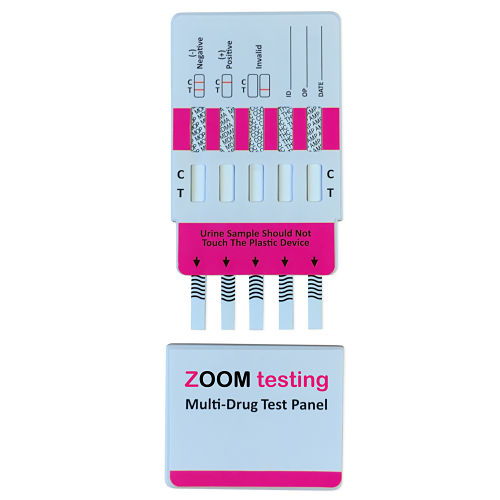About This Article
Zoom Testing has supplied drug testing kits to UK customers for nearly 20 years. This weekly digest draws on our experience helping thousands of employers, parents, and individuals understand emerging drug threats and workplace testing requirements. Always follow current UK legislation regarding drug testing.
Published: 21 November 2025 | Last Updated: 21 November 2025 | By Anthony Cunningham
Contents
Welcome to this week’s digest of drug testing news from across the UK and beyond. Each week, we monitor developments in substance use, contamination alerts, policy changes and testing innovations that matter to employers, parents and testing professionals. This week’s roundup includes alarming reports of contaminated vapes hospitalising schoolchildren, dangerous ketamine contamination spreading in Manchester, and questions about whether detection-only approaches actually improve safety. Here’s what you need to know.
The Vaping Crisis Nobody Saw Coming
The most alarming story involves young people being admitted to hospitals after using vapes containing dangerous substances – and not just nicotine. University of Bath researchers have found Spice in vapes seized from English schools, with students often believing they’re using cannabis vapes. Meanwhile, authorities are flagging vapes containing etomidate, a sedative with dissociative effects now earning the nickname “zombie vapes.”
The Advisory Council on the Misuse of Drugs warns that limited testing of imported e-liquids means the true scale is likely underestimated. They’re pushing for etomidate to be classified as a Class C drug and calling for expanded testing of vape products. Four Teesside councils have now jointly funded a contract with Teesside University to speed up testing after multiple hospitalisations.
For employers, this represents a double challenge – traditional drug testing won’t detect these novel substances in vapes, and employees may genuinely not know what they’re consuming. Understanding what synthetic cannabinoids are and how they differ from natural cannabis is essential for developing effective testing strategies.
Contaminated Ketamine Spreading
If that wasn’t enough, Manchester has issued urgent warnings about ketamine contaminated with medetomidine, a potent veterinary anaesthetic used on large animals. MANDRAKE harm reduction service confirmed multiple samples testing positive for the contaminant, which can be deadly when combined with ketamine’s sedative effects.
Medetomidine wasn’t added deliberately as a cutting agent – it appears to be cross-contamination during production. This makes it particularly dangerous because users have no way of knowing their ketamine is compromised. The substance can cause severe respiratory depression, and when combined with ketamine, the risk multiplies. For more information on this substance, see our guide on what ketamine is and its effects.
Synthetic Opioids: The Growing Threat
The spread of nitazenes continues to worry experts. These synthetic opioids are appearing in counterfeit medicines sold illegally online, often alongside fentanyl. A new anti-drugs campaign has specifically warned young people about the serious risks associated with these substances, which are many times more potent than heroin and can cause fatal overdoses with tiny amounts.
The Home Office released updated Drug Testing on Arrest data covering January to March 2025, showing continued patterns in drug use among arrestees. The data provides useful benchmarks for understanding regional variations in substance use.
What Customers Say
“I bought these to test my PCV Drivers and they worked very good. Delivery was very fast and they were very quick at replying to any queries when e-mailed. Will be using them again in the future if needed and are highly recommended.”
– Kayleigh R. ⭐⭐⭐⭐⭐
“Top quality kits delivered in a timely manner. Also upgraded my order from 7 panel to 10 panel at no extra cost. Highly recommended very professional company.”
– Glynis ⭐⭐⭐⭐⭐
“I bought these so that I could test my teenager…The kits arrived very quickly and with full instructions. Test itself was easy to use and I would recommend this item to any parent in a similar situation to me.”
– Sarah H. ⭐⭐⭐⭐⭐
Testing Innovation Across the Tasman
New Zealand is rolling out random oral-fluid roadside drug testing, screening for THC, cocaine, methamphetamine and MDMA. Wellington gets the first rollout in December, with nationwide coverage expected by mid-next year. The Conversation raises an important question – will detection alone improve road safety, or does it need to be part of a broader strategy?
The distinction matters for employers too. Random testing identifies problems, but without proper support systems and rehabilitation pathways, you’re just playing detection whack-a-mole. As Australia discovered, drug-driving deaths have now overtaken drink-driving despite strict laws, suggesting deterrence alone isn’t enough.
The Benzo Bump
Here’s an odd cultural effect – searches for lorazepam surged after the latest series of The White Lotus featured the anti-anxiety drug. It’s a reminder that media portrayals influence drug-seeking behaviour, particularly among younger demographics who might not understand the addiction potential of benzodiazepines.
The timing is concerning given warnings about illicit production of benzos. A new webinar on 28 November will address the lethal interaction between benzodiazepines, z-drugs and opioids – essential viewing for anyone involved in workplace drug policy.
Men’s Health and Substance Use
The government’s first Men’s Health Strategy explicitly acknowledges that men’s higher propensity to smoke, drink, gamble and use drugs is impacting families, workplaces and communities. Men are less likely to seek help and more likely to suffer in silence – patterns that manifest in workplace absence, reduced productivity and safety incidents.
Collective Voice responded by welcoming the recognition of substance use harms but warning there’s little point encouraging men to seek help if services aren’t properly funded. For employers, this highlights the importance of having clear pathways to support, not just detection systems. Understanding what happens if you fail a drug test at work is crucial for developing supportive policies.
International Context
Belgium’s status as Europe’s potential first “narco state” shows how deep-water ports and Schengen freedoms create perfect conditions for traffickers. The National Crime Agency warned this week that Friday-night drug deals in the UK are helping fund Russia’s war machine through sophisticated money-laundering networks.
It’s a reminder that workplace drug testing isn’t just about individual safety – it’s about not inadvertently funding organised crime networks that rely on user demand to operate.
What This Means for Your Testing Programme
The proliferation of novel psychoactive substances, contaminated drugs and sophisticated vapes presents a genuine challenge for standard urine drug testing panels. While comprehensive screens still catch the vast majority of workplace drug use, the emergence of substances like etomidate and medetomidine means visible impairment should always trigger investigation, even with negative test results.
Saliva drug testing offers advantages for detecting recent use, but no test catches everything. The key is combining testing with observable behaviour monitoring, clear policies and – critically – access to support services when problems are identified.
Employers need to ask themselves: if an employee tests positive, what happens next? The New Zealand and Australian experience with roadside testing suggests that detection without rehabilitation simply shuffles the problem around rather than solving it. ACAS guidance on drugs and alcohol at work provides essential advice for employers developing fair and effective testing policies.
Take Action: Protect Your Workplace
At Zoom Testing, we’ve been supporting UK employers with reliable drug testing solutions for nearly 20 years. Whether you need comprehensive multi-panel tests or targeted screening for specific substances, we can help you develop a testing programme that protects your workplace while supporting employees who need help.
UK employers should familiarise themselves with current UK drug driving legislation and workplace testing standards. For comprehensive information on harm reduction and substance awareness, Talk to FRANK provides valuable resources for employers and employees alike.
Understanding what 12 panel urine drug tests look for helps employers select appropriate screening methods. For organisations implementing comprehensive workplace drug testing programmes, combining multiple testing methods with clear policies and support pathways delivers the best outcomes.
About the Author
Anthony Cunningham – Drug Testing Expert & Editor
Anthony Cunningham, BA (Hons), MA, is a UK-based drug testing expert and editor with over 20 years’ experience running Zoom Testing, a trusted source for accurate drug testing kits and testing guidance. He creates clear, evidence-based articles using UK legislation, workplace compliance standards, and harm reduction best practices. Where possible, content is reviewed by testing specialists and compliance professionals to enhance accuracy and reliability, helping readers make informed testing decisions.






